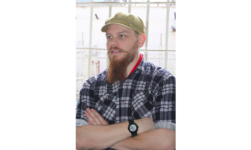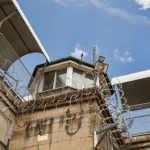Jock Palfreeman on His Denial of Parole & Rights Advocacy in a Bulgarian Prison

The Sofia City Court denied Jock Palfreeman parole on 17 July. Bulgarian Judge Nikolay Mladenov rejected the Sydney man’s bid for parole, in a decision that many believe was motivated because of his prisoners’ rights advocacy.
The 32-year-old Australian is currently serving a 20 year prison sentence in Bulgaria over a 2009 murder conviction. The charge relates to a 2007 incident in the capital city of Sofia that saw Palfreeman intervene in a racially motivated attack on two young Romani men by 15 football fans.
The parole denial came just weeks after Palfreeman ended a 33 day hunger strike he’d undertaken inside a local correctional facility, with the aim of drawing attention to the overly repressive treatment he’d been subjected to at the hands of prison authorities.
Those in charge have been cracking down on Palfreeman over the prison reform activism that he and the Bulgarian Prisoners’ Rehabilitation Association (BPRA) have been pursuing, which has exposed corruption within the local prison system and resulted in better conditions for inmates.
Jock is currently back in Kazichene Prison, after having spent a period in the hospital at the Sofia Central maximum-security gaol during his strike. And he recently took a moment to put his thoughts down in writing regarding the parole decision and the eleven years he’s already spent behind bars.
When injustice becomes law
“The parole hearing wasn’t really a hearing at all, because even the judge cut the hearing as he said he had another case to go to,” Mr Palfreeman explained. The “judge released an infamous criminal on parole in 2017 and was attacked by the media” for doing so.
“And since then, this judge doesn’t release prisoners on parole,” the noted antifascist told Sydney Criminal Lawyers. “So, the feeling is that this parole denial shouldn’t be taken so personally, the level of corruption is extremely high, and many judges simply are too afraid to do their jobs.”
Going back three years ago, under progressive prison authorities, Mr Palfreeman was considered a model prisoner, with no marks against his name. Indeed, he was permitted the occasional overnight release due to his good behaviour.
However, this all changed in early 2017, when Petar Krestev was reinstated as director of Sofia Central Prison: a position he lost in 2014 over human rights violations that Mr Palfreeman helped expose.
And this situation was further compounded with the formation of the conservative Third Borissov government in May 2017, which brought the appointment of Nikolai Prodanov as vice minister of justice. For Prodanov, Palfreeman’s rights campaigning is a problem that needs to be dealt with.
Resistance becomes duty
“The hunger strike was a protest against the corruption of then vice director of Sofia Prison Desislav Traikov,” Palfreeman made clear. He alleges that Traikov has taken bribes from “infamous gangster” Kamen Jelev. And this led to the spread of corruption throughout the prison.
Palfreeman further alleges that Mr Traikov and his partner the National Prison Authority’s Milena Gencheva revoked his good behaviour rewards. And this was to promote a market in prison privileges, which increase in value when the rights of prisoners are eroded.
“The protest achieved the result of highlighting the corruption not only with Desislav Traikov, who is now the director of Sofia Prison,” Palfreeman outlined, “but also of the national director, who later wrote some more illegal orders and has subsequently been suspended for other corrupt practices.”
A fateful intervention
On 3 December 2009, Palfreeman was convicted of the murder of 20-year-old Andrei Monov and the attempted murder of then 19-year-old Anton Zahariev. Palfreeman has always maintained that the knife wounds were a result of self-defence.
After having recently enlisted in the British army, Palfreeman flew to Sofia in late 2007 to take a brief holiday visiting friends. However, in the early hours of 28 December, Palfreeman witnessed a group of football fans setting upon two Romani men.
As he noticed the group of about drunken men moving in upon one of the men from the minority ethnic group, then 21-year-old Palfreeman made his way across the public square in the capital to defend the young man against the onslaught.
The group of football fans then turned upon Palfreeman, who pulled out a knife he’d been carrying to scare them off. In the resulting melee, two men were wounded. And the young man who lost his life in the incident happened to be the son of a prominent politician.
A local friend of Jock’s, Dessi Tzoneva, explained back in May that the court never accepted Palfreeman’s version of events due to the fact that the deceased “was the son of a man from the political establishment”.
“The court decided to completely ignore the line of the defence, their witnesses or crucial evidence,” Ms Tzoneva stressed. “And important CCTV footage went mysteriously missing.”
A syndicalist rights movement
Due to his prisoners’ right advocacy, Mr Palfreeman was nominated for the Bulgarian Helsinki Committee Human of the Year award in late 2015. But, due to a backlash from conservative politicians and the media, his nomination was revoked, and the BPRA stood in his place.
The BPRA was established in July 2012. Its members are current or ex-inmates campaigning for basic rights. “Apart from actively participating in law reforms that entered into force in 2017,” Jock explained, “we have successfully organised a form of legal aid for repressed or abused prisoners.”
Palfreeman wrote that the current Ministry of Justice is the most corrupt he’s seen. And if its levels of repression are taken as a measure of the impact of the BPRA, then they’ve been very successful. And he added that Prodanov has vowed to “put an end to human rights activists in prisons”.
“Ironically, with the illegal activities coming from this Ministry, of course, more and more prisoners are supporting the BPRA and identifying it as their representative,” Palfreeman continued. “So, actually, instead of repressing the BPRA, the attempt has seen us grow.”
The fight continues
At the time of his hunger strike, prominent human rights lawyer Geoffrey Robertson called upon the Australian government to provide Palfreeman with “immediate representations”, as he’s “a human rights hero being made to suffer extreme privations because of his good work”.
Although, as far as Palfreeman is concerned, his time inside hasn’t offered up too much. “There are no deep philosophical or meaningful lessons,” he asserts. “It is just a constant battle between a small group of normal people, fighting another small, but powerful, group of corrupt egomaniacs.”
“I see in my future, struggle.”







